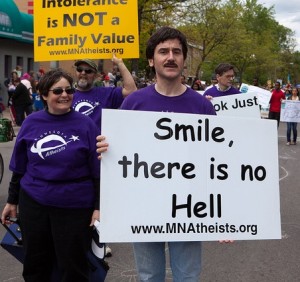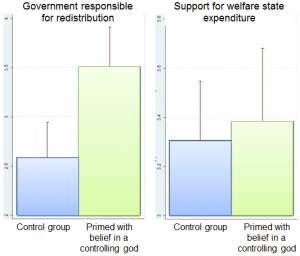Back in 2008, I wondered whether the reason that the religious give more to charity than the non-religious might be that they get more out of it. They get an extra benefit from charity (an anticipated reward from their God) that atheists don’t. When atheists want to redistribute money, they would prefer to do it via taxation (because that minimises the risk of free-riders – people who don’t contribute their fair share).
Well it turns out that Ceyhun Elgin, at Bogazici University in Istanbul, and colleagues have been thinking along the same lines. They were wondering whether it might explain why religious countries tend to have higher income inequality than non-religious countries. Their analysis has just been released – you can download the working paper here.
The first thing they did was to develop a mathematical model, which showed that the idea was plausible. Agents in their model get more satisfaction from charity if they are religious, and so (they found) prefer a lower tax rate. That, in turn, means lower levels of income redistribution. It’s all complex stuff and I have to confess that I haven’t taken the time to try to understand it, but I’ll take their word that this is what they’ve shown!
Then they to some multiple-regression analyses of real-world data. They found that, after controlling for GDP and also for type of religion (Protestant/Catholic/Muslim), countries with high levels of belief in the afterlife also have high levels of income inequality, low levels of tax, and low levels of government spending.
All this tallies well with what other research has shown. In my own analyses, I found that high levels of prayer are associated with low levels of welfare payments for the unemployed, even after controlling for a range of factors.
Of course, there are other reasons why religion might be linked to income inequality. There’s good evidence that religious people aren’t as anxious about losing their jobs, because God (and their Church) will provide.
More importantly, high levels of income inequality are linked to all sorts of societal problems, as well as high levels of anxiety (for rich and poor, although mostly for the poor). That could increase religious beliefs. There’s good theoretical reasons to think this, and also some evidence from studies comparing countries (including my own).
Elgin suggests that religious countries might not be as unequal as the statistics show. That’s because charitable benefits are often not counted as income. However, given that charitable donations are dwarfed by government welfare (even in low welfare countries like the USA), I don’t think this is likely.
What’s more, it’s not true that the religious prefer small government. There is one area of government spending that they are in favour of – and that’s defence spending! So the effect of religion on government welfare spending may be even more dramatic than Elgin’s figures suggest.
 This article by Tom Rees was first published on Epiphenom. It is licensed under Creative Commons.
This article by Tom Rees was first published on Epiphenom. It is licensed under Creative Commons.













